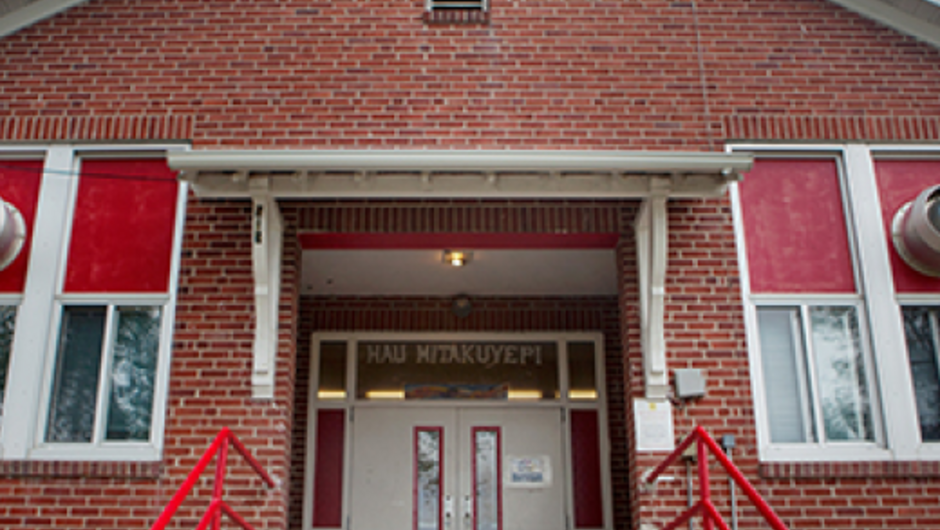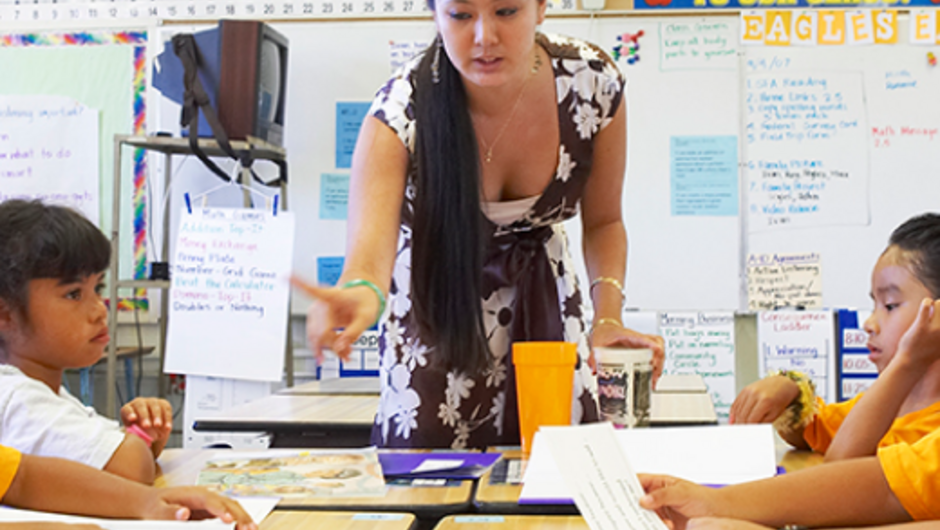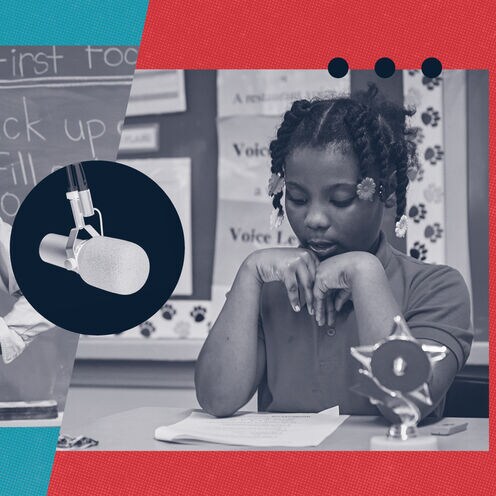
Episode 4: Young Changemakers
Even the youngest students can make change in their communities.
The students and leaders of Kendall-Whittier Elementary in Tulsa, Oklahoma, talk about the Tulsa Changemakers program and how it gives kids a chance to find their voice while they make change in their local communities—before they enter middle school.
Listen
View transcript
JONATHAN VO
THEME MUSIC
SFX
COLD OPEN:
JONATHAN: Back when I was in college, I was president of a student organization called ‘Brothers About Change’. As an org, we played a leading role in tackling challenges in our school community that we wanted to see made better. We’d put on events, we raised money, and we tried to draw attention to important issues affecting the people around us.
Now, that was something I did in college, but on today’s episode of Changing Course, I’m gonna introduce you to some kids doing similar work in elementary school.
That’s right: we’re taking you to Kendall-Whittier Elementary School in Tulsa, Oklahoma.
We’ll look at how students are finding their voices and learning how to make a powerful impact in their local community before entering middle school.
Millie: “In Changemakers, you can, like, express yourself and you can tell ideas to other students. I feel proud of myself, 'cause I didn't know I could, like, speak out and do all of that.”
Andrew Spector: “Ultimately, this is about, like, repositioning young people, not as passive recipients of their lives, or school, or their communities, but as active and powerful stewards. Because when that happens, young people develop really important and valuable skills and the institutions that are attempting to serve the young people, they get better and more effective too.”
JONATHAN: From Teach For America’s One Day Studio, you’re listening to Changing Course.
I’m Jonathan Santos Silva, a 2010 Teach For America alumni on the Pine Ridge Reservation in South Dakota, and since leaving the classroom, I haven’t stopped partnering with educators, students, and communities to reimagine education.
We have so much to learn from schools across America moving education in a new direction, and a change in course will happen one school at a time.
Today, we’re visiting Kendall Whittier Elementary School, where students are supported by their teachers, families, and community partners to tackle local issues and make positive changes in their city.
You ready? Let’s go!
[Music out]
JONATHAN: Tulsa is the second largest city in the state of Oklahoma. Tulsa’s name stems from the native word “tulasi” meaning “old town” and was coined by the Lochapoka peoples. Tulsa was originally home to Caddo, Kickapoo, Muscogee, Osage, and Creek native peoples.
The city has been nicknamed the “oil capital of the world”, playing a major role in the American oil industry. While Tulsa was only about 200 people back in the late 1880s, over 700,000 people call Tulsa home today.
Tulsa Changemakers is a semester-long, 25-session after-school youth leadership program. While the program enriches elementary, middle, and high school students from across Tulsa Public Schools and Union Public Schools, today we’ll be focusing on the students of Kendall-Whittier Elementary School.
Here’s Andrew Spector, Co-founder and Program Director of Tulsa Changemakers, with more about the program.
Andrew Spector: My name is Andrew Spector. I'm originally from Bedford, Massachusetts, went to College of Charleston in Charleston, South Carolina, and moved out to Tulsa almost seven years ago as a 2015 core member through Teach For America.
Andrew: Our vision with Tulsa Changemakers is a future where Tulsa is a model city for youth driven impact. What this looks like is opportunities for young people to lead, and to exercise their voice, and to make important decisions, that's normal, it's not something that's extra, or one time, or occasional.
JONATHAN: Each semester, a small number of students identify a problem in their school or community, conduct research, and come up with a plan to address the issue with support from their school leaders. In the past, students have tackled issues including climate change and environmental sustainability, student mental health, and homelessness.
Andrew: It's about building a city where, if you're a young person growing up in Tulsa, there are lots of opportunities for you to be able to lead and to share your voice and to have choice over, over what's happening.
JONATHAN: At the end of the semester, students present their findings at a citywide gathering called “pitch night”. Changemakers ultimately walk away from the program with not only leadership skills, but a strong sense of civic responsibility, personal agency, and deeper connection to their local community.
Andrew: Ultimately, this is about, like, repositioning young people, not as passive recipients of their lives, or school, or their communities, but as active and powerful stewards. Because when that happens, young people develop really important and valuable skills and the institutions that are attempting to serve the young people, they get better and more effective too.
JONATHAN: For Dr. Ronda Kesler, Principal of Kendall-Whittier Elementary, the value of Tulsa Changemakers being a part of her school is felt at a core level.
Dr. Kesler: Changemakers has become a staple, through Ms. Brush and now Mr. MacTough. It allows students who want voice, who want to have a positive effect on their school community, who want to grow and learn how to develop projects and present and serve. It gives them an area, a venue for doing that and it allows them to explore their creativity while developing really important citizenship skills and collaborative skills. These are skills that are gonna go with them into their future.
Dr. Kesler: And I believe that it's changing the course of their lives because they're seeing potential in themselves lived out as it's developed under the guidance of folks like Ms. Brush and Mr. MacTough, and that affects every person they come in contact with. That affects their classmates, their grade levels, and then the projects that they do, not only affects the school, because the school is allowed to be part of- whether it's canned foods or collection of socks and underwear for those that are underprivileged or for selling tie dye bags and, and giving the dollars to selected agencies or places that could use the money to help support causes.
Dr. Kesler: They are seeing themselves as truly a changemaker and they are affecting our entire school by allowing them to also participate in these projects that these students design, and it's- that in turn affects the community beyond our school.
JONATHAN: Here’s Andrea Brush, one of the teachers Dr. Kesler mentioned, who works closely with students in the Tulsa Changemakers program.
Andrea: First of all, I think you never get to talk about the problems of the world.
Changemakers puts that at the forefront of like, "No guys, really like what should we work on?" And their scope, we talk about scope. Their scope can be like school, it can be neighborhood, it can be city, it can be state, it can be the nation, but kids are ready to talk about that stuff.
They're really listening to their community. They're really making these plans. They're sharing things in an authentic way and it... so it's not just for a project, right? It's not just for a grade, they're intrinsically valued to like, to be here and represent themselves and their ideas. So they... Like kids show up when they're on the line.
Jonathan: Mm.
Andrea: But I would also say, like, kids who don't feel necessarily empowered by their current lot in class, like maybe they're, they're low in something, they, they can show up for Changemakers. They have a so- source of pride at the school and then they can, like, they can start showing up. And they know they're capable, and they know they're capable of success. I still remember like a couple years ago I had a student who was a couple years behind in reading. And I had a teacher make a comment to me like, "He's in Changemakers? Is that-
Jonathan: Mm.
Andrea: ... a little bit like, too much like speaking and wri... Like, is he doing that? Like, is it... is he okay?" And it's like, come to pitch night, come see how okay he is. Like, come see how... Not okay. Like how see... come see how great he is. Like...
Jonathan: Yeah.
Andrea: (laughs) And, and, and they'll do it. Like they'll put in the work. I... Like, I... I think part of the problem with, like, schoolwork and academics is, yes, kids should care, yes, it's our job as teachers to get kids to care about coursework, but there's not a difference made, besides grades, um, when they turn stuff in.
Jonathan: Yeah.
Andrea: Here it's like, like we graph, we charted our stuff that they didn't need to do that for our project when they were, like, “our goal's 300, like let's graph our results.”
Jonathan: Right.
Andrea: Like, yeah, well, we can pull in math, that wasn't intentional, but they were like, "We need to track this."
Jonathan: Mm.
Andrea: Um, they're intrinsically valuable to pull and stuff.
Jonathan: Right. So I think, you know, something that I'm picking up or I... you know, and you can correct me or, or challenge it, but it seems like there's one way, which is like, "Hey, we've got this curriculum, we've got this content, why aren't they writing this? Or doing math on this?"
Andrea: Yeah.
Jonathan: Stuff that may or may not have any relevance whatsoever.
Andrea: Yeah.
Jonathan: And then on the other side, there's Changemakers, rather than trying to drag kids uphill to do something they don't want to do, they are bringing the writing, the speaking, the math into problems or the challenges that really are meaningful to them that they... that... it sounded like these are not made up problems, they walk past these pro- they see them in the community. So there's already a-
Andrea: Yeah.
Jonathan: ... an in- like you said, an intrinsic motivation or desire to see something different.
Andrea: Yeah. And it... And I mean, like every project is, is different.
Jonathan: Mm-hmm (affirmative). Like, what is the root... Like the, the approach that we should take? If I'm at school, I'm like, all right, I love this idea. How do I do it? What is the right way to do it?
Andrea: I would say, so first I would focus on the process over product. Process being, like, really get kids to do some team building with each other, 'cause they're gonna talk about some tense things, so it's important that they respect each other. Think about the connections they can make to their community. If your community is not behind it, and you need your community’s support, best way to get it is to make sure it's something they're already on board with, which is also, like, foundations for any community work, right? And then I... Like really truly, like, let your kids take the reins. And I would say, unless you like, really think it's necessary, don't step in. They're gonna make mistakes.
Jonathan: We hear that.
Andrea: Yeah. Don't-
Jonathan: They say that.
Andrea: (laughs) You, you heard that... Yeah. They hear us say like, "She doesn't..." Is like, "She doesn't really help us. She kinda gives us ideas, but she doesn't really help us."
Jonathan: Yeah.
Andrea: Yeah. (laughs) I really don't. (laughs)
Jonathan: That's so funny.
Andrea: Um, yeah. Because like also part of the process in my mind is wha- whatever they do for their project is at the end, they need to evaluate it and they need to like say, “okay, we, you know, we set goals, like, did we meet those goals? What was the most successful thing? What was the least successful thing?”
There's a session on a focus group where they talk to peers, and they get feedback from that. So it's not just, ‘we did a project we're done, we did pitch night and we shared,’ there's a lot of reflection for work, that happens that like makes kids slow down again. So it was like, okay, if you wanted to do this project again, and the group I had last fall had this spinoff project that they wanted to do, part of the way they leveraged classrooms, felt like that was like a weak part. Like they, they were like in, in retrospect, like we could have, we probably could have um talked to classroom teachers more. That seems like a way more rich experience than to have hassled them in December and said like, "Hey, you guys need to talk to teachers more."
So I think if you're embracing that, that like more of a process than just a product, that's the first step, 'cause to me the program is also not, getting kids to do community work, or getting kids to have an afterschool program-
Jonathan: Mm-hmm (affirmative).
Andrea: …or getting kids to do rigorous academic work through an afterschool program, or social justice work. It's to get kids to feel empowered in themselves that they could do this work again and again, and understand the world's a very complex place and that there are a lot of good people who are working to make it better, and that they can join them because they are one of those people.
Jonathan: You know learning to be independent as a, as a, as a leader and a learner. So that's really beautiful.
Jonathan: I had a, um, a friend or mentor, Kate Crow, she's also TFA. She taught me to always, you know, when I went into a room as a principal, to look for the sweaty brow. Who's doing the work? And it sounds like in Changemakers, the kids are sweating.
Andrea: Yeah.
Jonathan: They're thinking about the world, they're, you know, conceiving of a challenge and that's... ideally, that's what we want. We want kids doing the heavy lifting, right? 'Cause if they're not lifting, they're not learning.
Andrea: Yeah.
<music transition>
Jonathan: What is it that I should be asking? What else, you know, that last piece that we should know about your school, about Tulsa, uh, Changemakers about what you all are really trying to do there with these young leaders?
Andrea: Yeah. So I think, I, I think one other thing that's, like, really specifically interesting about the Changemaker organization, it... well, one it's, it is a lot of TFA, uh, or former TFA. We have coaches who aren't Teach For America and they're, they're also like doing great, but I think part of what makes a good coach is that you're social justice oriented, and like you're there to show up for kids and like have those conversations with kids.
Jonathan: Mm-hmm (affirmative).
Andrea: Two specifically, um I think the success of the program has, has been really helpful that it is local, in that, I'm like, I'm not the only coach. What's happening at Kendall Whittier is happening across Tulsa.
JONATHAN: She’s right. There are 33 schools, across two school districts currently running the TulsaChangemakers program.
Andrea: Those coaches, like we talk to each other. We talk about where we're at in sessions. I also am a coach mentor, so I have check-ins with coaches at other sites, each week. So it's not like you're... If you're hearing this and you're ins- inspired and you know, you're like, "Oh, I just want the curriculum. I just wanna, like, look through this," that's great. But like part of it is also like, it's, it's a, a lot of people working towards the same goal of empowering kids.
Jonathan: Mm-hmm
Andrea: And and we are leaning on each other. I, I don't do this work by myself. I have the support of my school, I have the support of my administration, especially my families of my kids.
Jonathan: Mm.
Andrea: And having those connections present are critical to success.
Jonathan: Yeah. I was gonna say y- you were talking about the Changemaker organization, but it also sounded like earlier when you were describing Kendall Whittier, not just that admin and the teachers, but the community around it, the businesses-
Andrea: Mm-hmm (affirmative).
Jonathan: ... that support... Like that's like a, a theme or thread throughout. This is just... this is not one... And I mean, y- you're ph- you're doing phenomenal work that the, the Changemakers mentioned, the great work you do, but it's not one teacher or one principal-
Andrea: Yeah.
Jonathan: ... this is a bunch of caring adults and young people.
Andrea: Yeah.
Jonathan: ... partnering together make this possible. This is really awesome. Thank you so much for bringing some incredible leaders to this conversation.
<music bed starts back up>
JONATHAN: Next, we’ll hear all about those experiences from the students themselves, but first, we’ll take a break.
<music bridge>
MIDROLL AD BREAK
JONATHAN: Let’s hear from Millie, Rosalinda, and Lola, students at Kendall-Whittier.
Millie: My name is Millie…
Jonathan: And what grade are you in, Millie?
Millie: Sixth grade.
Jonathan: Holy smokes.
Millie: (laughs)
Rosalinda: My name is Rosalinda, and I'm 12, and I'm in sixth grade.
Lola: My name is Lola, and I'm in fifth grade.
Jonathan: Awesome. And what is your favorite subject?
Rosalinda: Um, science and geography.
Millie: My favorite subjects are geography and science.
Lola: My favorite subject is science, because, I like to do experiments with my teacher.
Jonathan: What do you like so much about geography and science?
Millie: Uh, geography, uh, like, right now we're doing a project. It's about national parks.
Jonathan: Mm-hmm (affirmative).
Millie: And... Yeah. And in science, we're no- we're learning about, uh, plant cells and animal cells.
Jonathan: We've been hearing about Kendall-Whittier and especially about Tulsa Changemakers, and from I understand, you're a part of that program. Can you tell me a little bit about the Changemakers program that you're part of?
Lola: So, what we do is we find, like, problems that sort of need to be, like, fixed and what we did, um, this semester, we tried to help kids in need.
Jonathan: Hmm. So how do you select the, the problems? Who gets to choose, um-
Lola: We all... We all agreed, and I, I'm the one that actually (laughs), um, brought up the idea because my dad was an orphan.
Jonathan: Hmm. So this was kind of personally connected to you?
Lola: Yeah.
Jonathan: Wow. So, what's that like? Do you just come into the room and say, "Hey, guys, I want to work on blah blah blah," and they just agree?
Lola: We-
Jonathan: Or do you guys have a discussion? What's that like?
Lola: Yeah. So like we were all sitting at a table, and we were just like all blurting out ideas, like what we wanted to do, and then we, like, at the end of like picking all of these, I said, "What about we do this?" And then we all, like, voted on the things that we would like to do.
Millie: In Changemakers, you can, like, express yourself and you can tell ideas to other students. And Ms. Brush is a really part... really big part of that.
Jonathan: That sounds really cool. Like a really powerful conversation. Is this type of conversation happening in all your classes, too? Like do you do a lot of, you know, debate and discussion in classes, or is this kind of special about Changemakers?
Lola: It's special about Changemakers. We don't really discuss anything in like the class, or at least I don't in our class.
Jonathan: What was it about Changemakers that made you say, "I wanna be a part of this?"
Millie: Just like the name of it. It just, it just int- inspiring.
Rosalinda: Well, because (laughs) I was really bored at home and I wanted to do something fun.
Jonathan: Yeah? What makes it fun? It sounds like, I mean, when you're gather- I mean, doing food drives and stuff that can actually be a little hard, but what do y- what makes it so fun?
Rosalinda: That, um, I get to help kids that, um, didn't have food or families.
Jonathan: Can you tell me about something that you've done with Changemakers that made you really proud?
Millie: Uh, uh, when we were helping kids in need and homeless people, I just feel like that's a very big part of Changemakers, because when you pass through the streets, you see a lot of people that don't have a home.
Jonathan: Hmm. Was it important to you that this project wasn't just something made up, but that it was connected to your own community?
Millie: Yeah. That's a really big part of that too.
Jonathan: Yeah.
Millie: Helping the community.
Rosalinda: I think my favorite part was whenever we reached more than our goal of the cans, and it really made me happy. Like, it's helped a lot of kids from there.
Lola: Like I was so happy that we had got over what we wanted to. We got 411 and our goal was only to get 300, and we all were like, "We're not gonna do this," but then so many people like brought in things, and we were like so happy.
Jonathan: Was there ever a moment where you were wondering if this was gonna have a big impact? Or did you know from the start that this was a really big idea?
Millie: At first, I thought that we weren't gonna collect that much items, but then seeing everybody getting, like... they also wanted to help, that, that... then I knew that we were gonna reach our goal.
Jonathan: Hmm. And so, something that you brought up, I don't think it clicked for me earlier, this wasn't just, and correct me if I'm wrong, this wasn't just you and other Changemakers, but this, really, was your entire school. Everybody got a part of this drive. Is that right?
Millie: Yeah, also the principal we talked to her and she was a really big impact too, 'cause she helped us with all of this.
Jonathan: Mm. Tell me a little bit about your school in general. What do you like about Kendall-Whittier? What do you like about your school, your classmates, your teachers? What makes it a special place to you?
Rosalinda: I've been here since I was a little girl. Um, I've been here for years. And my principal is my... Miss Kesler, she's really nice. Everybody here is really nice to me, especially each teacher, and I love my classmates a lot (laughs) especially my friends.
Jonathan: What about Miss Brush? Tell me a little bit about her. What is, what is, uh, she do as a teacher that makes you love that program, love your school and, and doing the cool things that you're doing with your community?
Rosalinda: Well, she really does fun stuff with little kids. (laughing) She makes them happy. Miss Brush is a great teacher.
Millie: Ms. Brush, she's really nice. She's a great person to talk to. I feel like, since she's really young, we can just talk to her about our feelings.
Jonathan: Mm-hmm (affirmative). Do you think that's important? For young people to adults to talk to about their feelings?
Millie: Yeah, I think it's really important, 'cause, like, I feel like in elementary, there's a lot of, like, drama and stuff and I feel like we can talk to her about it.
Jonathan: Hmm. You could probably teach a lot of our listeners ab- a bit about talking-
Millie: Yeah.
Jonathan:... to people you trust. That's a good thing.
Rosalinda: I had to write, like, (laughing) an email to Miss, um, to Doctor Kesler, and Miss Brush was there to help me with that.
Jonathan: Did that make you nervous when you had to write an email to the principal?
Rosalinda: Yes (laughs).
Jonathan: Yeah? Why was that so, why was that so nerve-wracking?
Rosalinda: Because I really never talked to her like, like that. And I never said anything to her. So, it really made me nervous.
Jonathan: Mm-hmm (affirmative). And on- once you finally sent it off, how did you feel?
Rosalinda: I felt good.
Jonathan: Yeah? Why?
Rosalinda: Yeah. Because, I mean, I was proud of myself. I am very shy, like, when I don't know people I don't talk to them. I like, I'm very shy. So, it was my first time sending an email-
Jonathan: Mm-hmm (affirmative).
Rosalinda:... and especially to her, and, but it made me good, feel good.
Jonathan: That's awesome.
Now did, did you participate, I, I heard about this, uh, part where people could share their ideas, they had to get in front of people and you- did you participate in that?
Millie: Yeah, I was, like, really nervous, 'cause we went to downtown-
Jonathan: Mm-hmm (affirmative).
Millie: ... and we like presented our project and I feel like that was really nervous, 'cause we had to talk in front of a lot of people and we had to get on top of a stage and that was really nervous.
Jonathan: Take me to that moment. You're super nervous.
Lola: Mm-hmm (affirmative).
Jonathan: You do not want to go on stage.
Lola: Yeah.
Jonathan: What made you work through your fear? What was it about-
Lola: Because,
Jonathan: ... the experience that-
Lola: Um, most of the people were probably scared as well, and like they probably felt the same way that I did, so I just wanted to like be confident and not be super scared.
Jonathan: Hmm. That's really cool. So how did you feel when, um, you get up there, you present, and not only did you get it out of the way, but you realized that your peers, the other leaders-
Lola: Mm-hmm (affirmative).
Jonathan: ... support your idea and they believe in it, too. Did you feel any sort of type of way when you, when you realized that they liked your idea?
Lola: I felt really happy, because like my dad was very, very sad. He, he actually had to live on the streets for a few months, he told me.
Jonathan: Mm-hmm (affirmative). Wow.
Lola: And he... And he was very happy when I went home and was like, "We're doing this."
<music transition>
Jonathan: What else should I know about your school and this program? Like if I'm just turning this on and I'll listen, I say, "Wow, this is really inter-." What else sh-should I know that I haven't asked about yet?
Lola: Our, our principal (laughs) is, is very helpful, too, because she was the one that agreed to do all this. So, she... So, she was a very big help in all of this, too.
Jonathan: Mm-hmm (affirmative).
Lola: And, um, I think that she is a very, like, good person, and I'm actually in choir as well (laughs).
Jonathan: Yeah? That's awesome. So wait a second. Let me get this straight. You sing?
Lola: Mm-hmm (affirmative).
Jonathan: You drum?
Lola: Yes.
Jonathan: You raise supplies for kids in need?
Lola: And I also play ukulele.
Jonathan: You play a ukulele and-
Lola: And that's all (laughs). That's all.
Jonathan: And what... And, and, and you're a public speaker, apparently, because you're up on stage sh-sharing your ideas.
Lola: Mm-hmm (affirmative).
Jonathan: What don't you do?
Lola: I don't know (laughs).
Jonathan: (Laughs).
Lola: I, oh, I don't, I don't have a job (laughs).
Jonathan: Okay. Well, you know, there's time for that. How old are you now?
Lola: I am 11.
Jonathan: Oh, see? You have time. You have, what? Five years before you can get your learner's permit? So-
Lola: (Laughs)
Jonathan: I'm just so impressed. I'm so impressed. Um well, you just keep on kicking butt, girl. I'm so proud of you.
Do you ever stop and look at that and think, "I really just did all that stuff that made me nervous and I'm, and I'm okay?" What do you think about yourself when you look back on all that?
Millie: I feel proud of myself, 'cause I didn't know I could, like, speak out and do all of that.
Jonathan: Mm-hmm (affirmative). So with that in mind, what advice do you have for other young leaders like yourself, who may be nervous about speaking or doing something and they're thinking about not doing it. What advice or encouragement do you have for them to step up and be a leader?
Millie: Uh, I would just say, like, to not be nervous, like calm down and think about what you're gonna say and just, like, be proud of yourself, because, like, once you're done, you'll see what you did and... Yeah. And one thing that also helped me was that my teammates were also, like, encouraging each other. That really made us feel better.
Jonathan: Wow. It's important to have good people to support you, right? Yeah. Awesome. Well, my last question to you is just, kind of, open ended. Is there anything else that folks should really know about Kendall Whittier or Changemakers that we didn't talk about yet? Anything that you're like, "I really gotta tell you this one last thing?"
Millie: I feel like get a teacher that can really help you, and... Yeah. Like Ms. Brush, she would just let us lead the conversations. And I think that's a really big part of that. And she would just, like, help us a little bit, here and there and I thought like that was really good, 'cause that helps you be independent.
<music transition>
JONATHAN: Here are Chaz and Tau’veaz, alums of the Tulsa Changemakers program.
Tau'veaz: My name is Tau'veaz Briggs. I'm in ninth grade. My favorite subject is most definitely geometry and I'm on the football team.
Chaz: My name is Chaz Briggs. I'm in seventh grade and I'm really good at playing the piano.
Jonathan: How did you learn about the program and, and why did you want to be part of it?
Tau'veaz: My amazing teacher, Miss Brush-
Chaz: Yeah.
Tau'veaz:... she um, she invited me and I accepted and then it was a very good experience and I've learned a lot of stuff and-
Jonathan: Cool.
Tau'veaz: I've learned speaking skills, um, talking skills, I learned how to be a better man.
Jonathan: Mmm. When you say being a better man, what are some of the, the ways that, that, that, that you show that in your daily life now?
Tau'veaz: I take responsibility. I also, I do everything I'm, like, I'm supposed to do. Take- do the chores, you know, like wake up, get my little brother up for school and things of that nature.
Jonathan: So, I've heard some interesting things about being a student leader there. One if the things I tal-, I heard about was that, like, sometimes Miss Brush would ask you to do things that are pretty hard, like writing an email to the principal or to another adult, or getting up in front of a crowd and giving a speech. Did you ever do anything like that, that was hard, or maybe nerve-wracking that you did not wanna do? Can you talk about it?
Tau'veaz: I was a little stage fright at first, like, our first, um, what, what did you call it? Like-
Andrea: The networking event?
Tau'veaz: Networking event, yeah. Uh, I wasn't as comfortable, like, talking to people, like hand shakes and things of that nature. But then like Miss Brush really helped me on it and then, we have to get up in front of a lot of people and talk, and I feel like Miss Brush helped me with that. I was very confident.
Jonathan: Mmm. Whe-, wha-, so you were scared, a little nervous about it going in, then you finished it. How did you feel when you got to the end and you achieved the thing you set out to do?
Tau'veaz: I feel like, like I just became a new man.
Jonathan: (laughing) That's awesome. What about you Chaz? What, was there anything challenging that you set out to do there that maybe you didn't believe you could do at first, but then you realized you could do it?
Chaz: Well definitely not emailing.
Jonathan: Yeah?
Chaz: That's pretty easy. But I felt, like, s-, nervous the first time I spoke in front of people on stage. I didn't really feel like comfortable. It's the first time I had that experience (laughs)
Jonathan: Oh.
Chaz: ... but, (laughing), yeah.
Jonathan: So, and, and the same question to you. So you get up there, you were nervous. Well first of all, how did you prepare for it? ‘Cause that can be very embarrassing. If you go up there and, and you don't know what to do. How'd you prepare for that?
Chaz: Well, while we was, well while were in the classroom where we were practicing, we like, stood up in like the order we were speaking and we were like, I like, whenever I was speaking, I, I imagined there was like a crowd, not really a crowd, but like all the chairs were filled. So whenever I got there it helped me to like imagine that they weren't there.
Tau'veaz: For me, um, we had this like, big board and it had what we had to say. And then we had wrote it down on a paper so we could like, try to memorize it. And then we stood in, um, arranged, like that we was gonna go, and then we practiced like 50 times.
Andrea: (laughing) So many times. (laughing)
Jonathan: Wow. Really?
Tau'veaz: [inaudible 00:05:50]
Chaz: (laughing)
Jonathan: What he say?
Tau'veaz: Fifty thousand.
Jonathan: Fifty thousand? (laughing) So like, I mean, here's the thing right. A lot of times kids go to school and their teachers ask them to do a lo-, stuff, and they're bored. They don't wanna do it. And yet, you're there d-, and you practiced this fifty thousand times. What was it about this project that made you persevere even though it was r-, you know repetition and practice and practice. What made you wanna keep going?
Tau'veaz: So one, I feel like I, I could do it. That's why. And also I feel like it was gonna be a challenge and I like challenges.
Jonathan: Mm-hmm (affirmative). What about you Chaz?
Chaz: Well same thing about challenges. Pretty, I feel pretty confident when I'm doing a challenge. I felt like, I know it wasn't gonna be like a very long project, but I felt like doing this group could help me like, in the long run.
<music transition>
JONATHAN: Here are some closing thoughts from Millie and Lola.
Jonathan: What advice do you have to other grownups about how they could be more supportive of young leaders like you?
Millie: I would say, like, so just listen to the kids, 'cause, like, a lot of kids just, like, have problems-
Jonathan: Mm-hmm (affirmative).
Millie: ... and I feel like an adult that you can talk to and talk about your feelings, whether it's, like, stuff you wanna do when you're, when you're older, I think that's important.
Jonathan: Oh, yeah. I agree. I think that's really important.
Lola: Maybe try and listen to the, those kids' ideas, and just like... And, and if it's not a very good one, then just like say maybe we can like change it a little bit, but don't like bring... Don't try and bring them down, like don't make them cry. Just like make them feel like a better person about themselves.
<music transition>
JONATHAN: And finally, here are some closing thoughts from Andrea Brush on the power of the Changemakers program.
Andrea: Theoretically, could you go in alone and do this? Maybe. But like the power of the program is that it is Tulsa Changemakers, it's not Kendall Wittier Changemakers, right? It's Tulsa Changemakers. We have networking events, kids get to meet kids from other schools who are doing their projects. They share their stuff. They share theirs, they like ask for advice, right? They're practicing their public speaking, they're doing all this, and they're jazzed about it because they're like, "Look at all this stuff we're doing. Look at all the i- impact we're having." And I think it's also only successful because it's like... it's grown sustainably.
Jonathan: Mm.
Andrea: It's not like everybody in Tulsa is trying to do this. It's people who are willing to be a part of this network and, like, do the work and show up. It's, it's only successful in places where it's like, people are there to be like, because I wanna... want it to be successful, not because I wanna try it as a one off. So I think-
Jonathan: Mm.
Andrea: ... that's really important.
[Theme music fades in]
JONATHAN: That’s it for this week. Thank you so much for listening to Changing Course, from Teach For America’s One Day Studio. I’m Jonathan Santos Silva. Peace.
SFX: School Bell
OUTRO
JONATHAN: Next time on Changing Course, we’re taking you to the Centennial State, visiting a high school in Denver, Colorado with a long history of student activism, where student leaders mobilized to successfully reunite their school several years after it was split in two.
Jonathan: Why was it so important for you to address this issue that you would never directly benefit from, as a student?
Andrea: It was important because we- we kinda got to experience what it was to be divided. We kinda wanted just to create the change for the following generations, so they could actually like take the advantage that we didn't get to take. And, also I have sisters. And I wanted to make that change for them as well, so they could have more opportunities than what I had-
Jonathan: Mm.
Andrea:... when I was still here at West.
JONATHAN: That’s next time on Changing Course. And if you loved the podcast, be sure to rate, review, and subscribe to ‘Changing Course’ on Apple Podcasts, Stitcher, or wherever you get your podcasts.
CREDITS
JONATHAN: Changing Course is produced by Teach For America’s One Day Studio in partnership with Pod People. Special thanks to my main man Michael Kress, Craig Hunter, Laura Zingg, and Georgia Davis from Teach for America, and the production team at Pod People: Rachael King, Matt Sav, Aimee Machado, Danielle Roth, shout out to Chris Jacobs, Shaneez Tyndall, and Erica Huang.
Last but certainly not least, thank you to the students and staff at Kendall-Whittier who shared their time and experience to help us make this episode: Rosalinda, Lola, Millie, Chaz, and Tau’veaz and Andrew Spector, Dr. Ronda Kesler, and Andrea Brush.
I’m Jonathan Santos Silva. Peace.
About the Show
Changing Course is a podcast from Teach For America’s One Day Studio that explores what’s possible when schools empower students in their own educational paths. Every episode, host Jonathan Santos Silva shares stories from students, teachers, and administrators about how they’ve reinvented traditional approaches to traditional education.
Don’t miss an episode! Subscribe to our podcast insider newsletter.
The monthly ‘One Day Today’ newsletter features our top stories, delivered straight to your in-box.
Content is loading...
Jonathan Santos Silva
Jonathan Santos Silva is the Founding Executive Director of The Liber Institute and creator and host of The Bored of Ed, a podcast that amplifies the voices of inspiring BIPOC educators who are changing the face of education. He has provided technical support to South Dakota’s Native American Achievement Schools and has served as a school founder and principal, instructional coach, and education consultant.
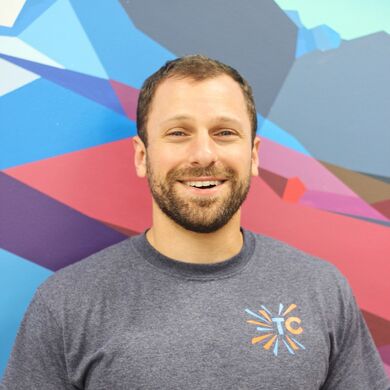
Andrew Spector, Co-Founder and Program Director of Tulsa Changemakers
Andrew Spector (Greater Tulsa ’15) is co-founder and program director of Tulsa Changemakers, a youth leadership development and action organization. Since its founding in 2016, Tulsa Changemakers has hired, trained, and supported 62 educators to guide 627 students at 39 schools in Tulsa Public and Union Public Schools to plan, execute, and measure 120 community impact projects. Andrew started Tulsa Changemakers as a Teach For America corps member teaching 6th grade in Tulsa Public Schools. He and his co-founder incubated Tulsa Changemakers under the nonprofit umbrella of Leadership Tulsa, working there as program managers.
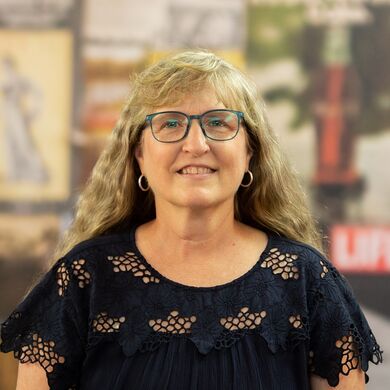
Dr. Ronda Kesler, Principal, Kendall-Whittier Elementary
Dr. Ronda Kesler received her bachelor of science degree from Oral Roberts University and master's degree in administration from Oklahoma University Tulsa. She has taught special education and general education in public schools in the states of Colorado, Washington, and Oklahoma for 20 years, along with homeschooling her four children in their early elementary years. After two years teaching special education at Hamilton Middle School, she became a behavior coach and positive behavior intervention support coach for the district before working as a special education coordinator, assisting 20 schools with special education guidance and support. In 2009, she moved into the capacity of principal at McKinley Elementary School, and in 2011 was asked to move to Kendall-Whittier Elementary where she have been ever since.
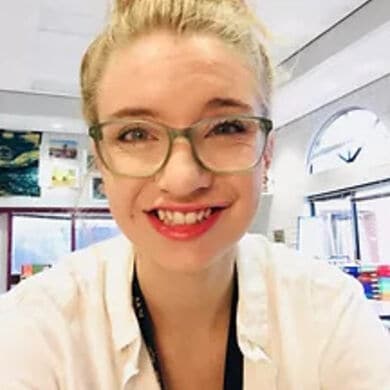
Andrea Brush, Visual Arts Teacher, Kendall-Whittier Elementary
Born and raised in Colorado, Andrea Brush White (Greater Tulsa ’16) came to Tulsa through Teach For America. With a background in studio art, she is entering her fifth year of teaching and returning to her role as the Kendall Whittier art teacher. Ms. Brush loves the excitement that comes from creating with kids every day and is excited to be engaged with her new team of Changemakers.
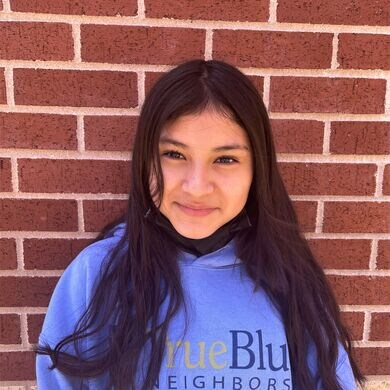
Milly Ambriz Perez, Student
Milly Ambriz Perez is a 12-year-old 6th grader at Kendall Whittier Elementary School who loves making change.
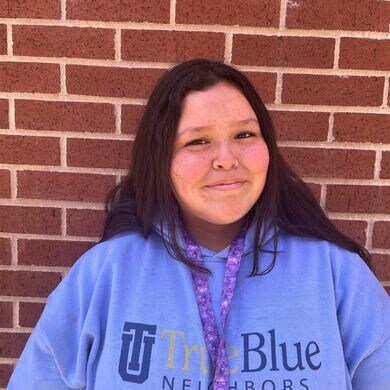
Rosa Linda Gam, Student
Rosa Linda Gam is a 13-year-old 6th grader at Kendall Whittier Elementary who loves helping her community.
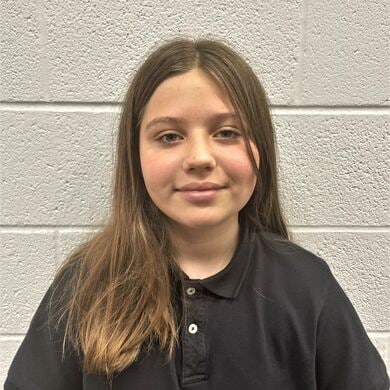
Lola Murray, Student
Lola Murray is a 5th grader at Kendall Whittier Elementary School who loves being creative and helping her school.
Sign up to receive articles like this in your inbox!
Thanks for signing up!
Content is loading...




